A holistic approach to supporting mental health
Are you questioning the dominant, medicalized, diagnostic approach to mental health?
This certificate invites you to take a step back and question the dominant framework, by considering more holistic and community informed approaches to supporting mental health.
Coursework emphasizes conceptual and clinical skills to prevent illness and promote health and well-being. The courses emphasize micro, mezzo and macro-level interventions that are informed by feminist, critical, structural and postcolonial theories. You'll learn advanced clinical practice skills in a variety of community settings that are defined by geography, membership or experience. Some community settings you'll study could include Indigenous, refugee, LGBTQ2+, disability and racialized communities, as well as post-disaster, and occupational and workplace communities.
How we can, in some way, disentangle ourselves, or liberate ourselves a little bit from fully subscribing to the current, medically dominated view of mental health? it's incumbent upon social workers to critically analyze the way we engage with or challenge the dominant models of practice.

Dr. Rick Enns, PhD
Researcher, Professor and Instructor for Community-Informed Practice
Theoretical and Philosophical Perspectives for Community-based Health and Wellness
An examination and critique of current and diagnostically-driven models of practice for health and well-being and consideration of alternative and community-based approaches informed by feminist, critical structural and postcolonial theories, as well transcultural and critical health and psychiatry perspectives.
Community-based Practice Models and Clinical Assessment for Community-based Health and Wellness
An examination of community-based health and wellness approaches including peer-support and recovery approaches, community-development approaches, social determinants of health and well-being, and social policy frameworks.
Community-based Health and Wellness Approaches I
Along with Community-based Health and Wellness Approaches II, this course will focus on requisite understandings and skills for community-based health and wellness in at least two diverse contexts including, but not limited to immigrant and refugee, post-disaster, Indigenous, LGBTQ2+, disability, and racialized communities or contexts.
Community-based Health and Wellness Approaches II
Along with Community-based Health and Wellness Approaches I, this course will focus on requisite understandings and skills for community-based health and wellness practice in at least two diverse contexts not covered in SOWK 614 and including but not limited to immigrant and refugee, post-disaster, Indigenous, LGBTQ2+, disability, and racialized communities or contexts.
What will I learn? Dr. Rick Enns has over 30 years experience in psychiatric setting as a social worker. In this interview he explains why he believes this specialization is so important for clinical social workers. Read the interview
Admission Requirements
- A Bachelor of Social Work (BSW) from an accredited/recognized institution.
- A minimum of 3.0 GPA on a 4.0 point system, over the past two years of full-time study (a minimum of 60 units) of the undergraduate degree.
- The equivalent of two years of full-time paid work or a minimum of 3,000 hours of paid and/or volunteer work in the human services field by the application deadline.
What is relevant social work and human service experience? - English Language Proficiency
Offers of admission are valid for the term to which you apply.




